Girls of school going age in South Sudan have myriad of challenges in their bid to access education with increased household vulnerability, archaic and inhumane cultural practices, lack mentors for girls and poor learning environment identified as key inhibitors to improved enrolment, attendance and retention. The situation is dire with UNICEF reporting that girls in South Sudan are more likely to die in pregnancy or childbirth than complete primary education. To promote sustainable learning outcomes, South Sudan in partnership with the United Kingdom government is continuing with the second phase of the Girls Education South Sudan (GESS) program aimed at increasing enrolment, attendance and retention in schools with greater emphasis on girl education. The programme is funded by UK Department for International Development (DfID) and will deliver £70million of aid over the course of five years.
GESS 2 will reach over 3,400 schools with cash grants, 295,000 girls with cash transfers and 2 million South Sudanese citizens with radio broadcasts. This phase of the programme will see a larger emphasis on low secondary school enrolment, especially the drop-out and retention of girls, as well as a focus on ensuring that children with disabilities can access education. The GESS 2 programme will also support the new South Sudanese curriculum by placing a heavy focus on the quality of education and improving learning outcomes at both primary and secondary levels across the country. Alongside improvements to the quality of education, cash grants will continue to allow school management bodies to identify and improve areas of great need. MASS is the Regional Anchor for Northern Bahr el Ghazal State (NBeG). Under the leadership of Jamesco Deng as the GESS Team Leader, MASS has contributed immensely to sustainable learning outcomes in the State. Jamesco opines that, as a result of inclusive education management, fraudulent activities have been eliminated leading to improved learning environment and increased enrolment, attendance and retention of children in schools.
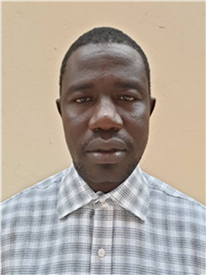
With the GESS project, School Management Committees (SMCs) have become powerful bodies whose members have enhanced skills to support education management by participating in planning, budget preparation, resource prioritization, funds allocation, activities monitoring and seeking for accountability for resources utilized. As such, schools are well managed and fraudulent activities eliminated with school materials and services procured competitively at market rates thereby promoting value for money- Jamesco Deng
Malual Kuel Primary School Borehole
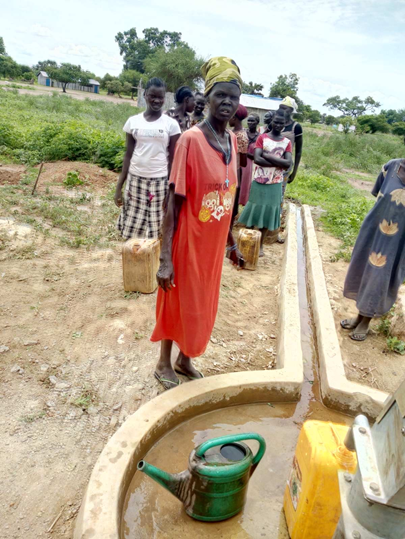
With funding from the department of Sustainable Development at UMCOR International, MASS drilled one borehole to increase access to safe water for 736 school children at Malual Kuel Primary School in Aweil East County of Northern Bahr el Ghazal State. The water point is shared with at least 500 surrounding community members who prior to the borehole drilling had to trek for 1 hour to and from the nearest safe water point. This is a tough ask especially for women who are expected to undertake additional household tasks including looking after children. Instead of covering the long walk to the nearest water point, most women preferred collecting water from unprotected and contaminated water sources shared with animals thereby exposing them to the risk of contracting waterborne diseases. Exposure to health risks increases additional burden to already vulnerable households living on under a dollar daily. Drilling of the water point closer to households has made it easy for women to access water while at the same time get time to tend to other household chores. Additionally, the water point will provide sustainable access to water for farming for interested community members for household consumption and as a source of livelihood.
Because of this borehole, my family will have clean water that will keep them safe from diseases. I don’t have to constantly visit hospitals to treat my children for diarrhoea or walk long distances to fetch safe water. The water has come closer to me and this to me is the greatest gift after the gift of life. I couldn’t have asked for a better miracle- Ahok Garang.
Civil Society Fund (CSF) Governance Project
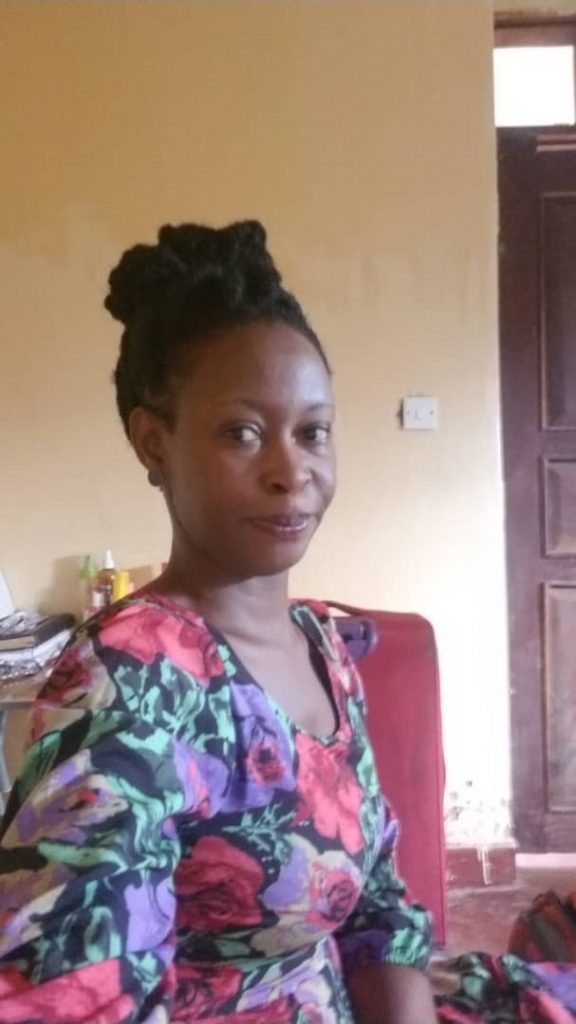
The Civil Society Facility (CSF) for South Sudan is a program funded by Embassies of Norway, Sweden and Netherlands to strengthen the capacities of civil society organizations to bring about positive changes in the lives of communities and community based groups including women and youth through improved service delivery. CSF selected MASS to implement civil society capacity strengthening in Northern Bar el Ghazel (NBeG) State. Among the beneficiaries of the project is Jenipher Mbaabazi; the Human Resource and Administration Officer and Farmers Lives Development Agency (FLDA) in NBeG State. MASS CSF staff met with Jenipher during a routine on job training visit and got her views on the project. During the interview, Jenipher lamented that the CSF-sponsored training has helped her improve HR management System at FLDA. As a result of the human resource training training, we developed effective and efficient Human Resource and Administration systems and processes and improved on our hiring and staff retention strategies thereby enabling us to achieve quality and timely project deliverables that have immensely improved the organization profile and ensured better services for our beneficiaries.
GM0120046MASS Project
MASS with funding from UMCOR International is implementing a migration project in Yei River County of South Sudan targeting vulnerable refugees, host community and Internally displaced persons. Through the GM0120046MASS project, MASS will construct projected 250 transitional shelters to shield the beneficiaries from human atrocities and risks associated with adverse weather conditions, distribute 250 solar lamps with phone charging capability and plant 10,181 fruit tree seedlings to promote afforestation with a long term objective of improving household livelihoods. There is an overwhelming optimism among beneficiaries and stakeholders that the project will change their lives for better. Below are extracts from our interactions with the beneficiaries and stakeholders.
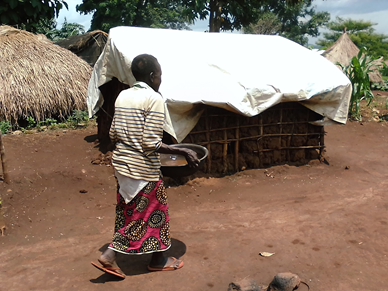
Maria Tiyu- Shelter Beneficiary: During a beneficiary identification process, one elderly couple identified for support through the project stated that benefiting from a transitional shelter will be a gift they had not anticipated. Maria Tiyu stated that over the years they have lived in a temporary shelter that require annual rehabilitation which they find expensive and difficult to manage. Maria further mentioned that at their age, it has not been possible to get jobs to enable them improve their shelter and that they have continued to rely heavily on well-wishers and humanitarian organization for support. The small scale farming the couple do is only enough for their household consumption. Their shelter is in a dilapidated state and according to the couple, the situation worsens during the rainy season when the shelter gets flooded. The couple stated that ‘’ If we are selected to get a new home, we will not have to worry about having cold and wet nights during the rainy season, we will be in a much better place’’
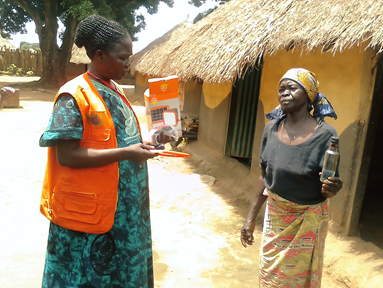
Margaret Moriba: Creation Care project (solar lamp) beneficiary: Leaving your country to settle in a foreign land is not anyone’s wish, my family and I found ourselves here because of war. Because of the war in Congo, we lost everything and were left poor. I never imagined I would find myself in this situation. Life in a foreign land is not easy, besides the conflicting cultural differences and competition for limited resources that at times lead to conflicts with our hosts, majority of refugees are poor and welcome support we get. Today you have given me a solar lamp, it might seem a simple gesture but one that has a big impact on our lives. Today I have seen light, for a long time I have used kerosene lamp which is expensive and most times produces smoke that affects my children. With this solar lamp, I don’t need to worry about cost of kerosene or smoke, all I need to do is place my lamp
Supporting Safe re-opening of schools in South Sudan post COVID-19 pandemic
Success story Teresa Aoowa Alfred
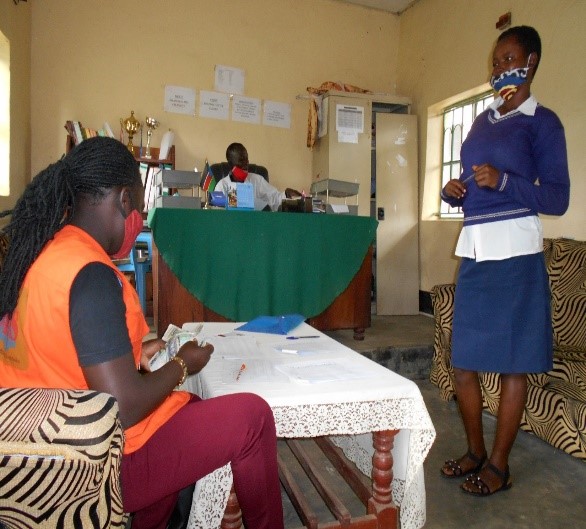
Education Cannot Wait (ECW) is a program initiated to ensure safe re-opening and return of pupils and teachers to schools following the COVID-19 pandemic. Through the project, schools are provided with Personal Protective Equipment (PPEs), teachers are trained on COVID-19 mitigation and on how to provide psychosocial support for pupils with trauma and girls in secondary schools are provided with cash transfers to enable them meet education and personal needs. The girls are also issued with re-usable dignity kits for menstrual hygiene management. One beneficiary of cash transfers is Teresa Aoowa Alfred a senior 4 refugee student in Yei. Teresa informed MASS staff that she is committed to completing her education and not even becoming a mother at such an early age was going to impede her determination to complete her secondary education. She believes that completing her education will make her a better mother as she will be able to access employment and offer the best life has to offer for her newly born son.
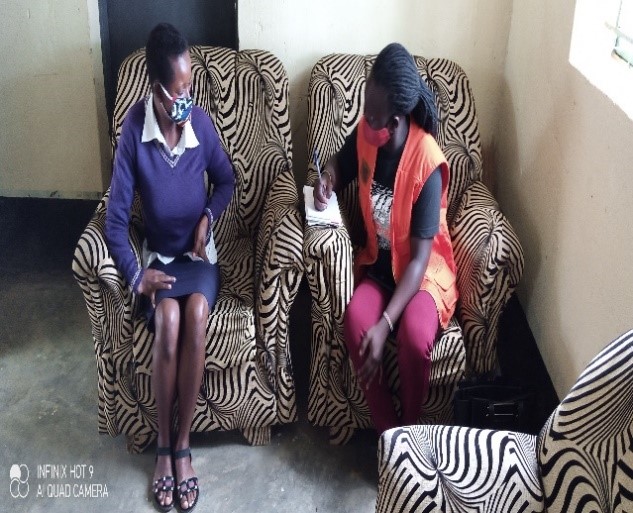
Teresa speaks well of the head teacher whom she says gave her a second chance at life when he allowed her back to school to continue with learning even after giving birth something she says is very rare. She says she has received a lot of support from the head master, teachers and fellow students that has motivated her to work harder and be an example to other girls who have dropped out of school because of early pregnancy. While Teresa regrets becoming a mother at an early age, she believes that it has also made her more responsible and motivated her to work harder in school and become a better mother and role model to other out of school girls. Teresa mentioned that she became pregnant at a time when she had dropped out of school after her single mother was unable to meet her education needs. Upon receiving the cash transfer, Teresa mentioned that the money will play a big role in helping her meet her education and personal needs. While concluding the interview, Teresa encouraged other girls who are out of school because of being young mothers by stating that ‘’I am a living example that becoming a mother at a tender age should not block your path to completing your education, with determination, dedication and hard work, you can achieve your goals in life regardless of challenges that might come ACROSS your path’’. To ECW donors, I will just say thank you for helping me stay safe from COVID-19 by issuing me with a mask and cash transfer to enable me meet my education and other personal needs. With this mask, I will keep my baby and other family members safe.
Investing in Education
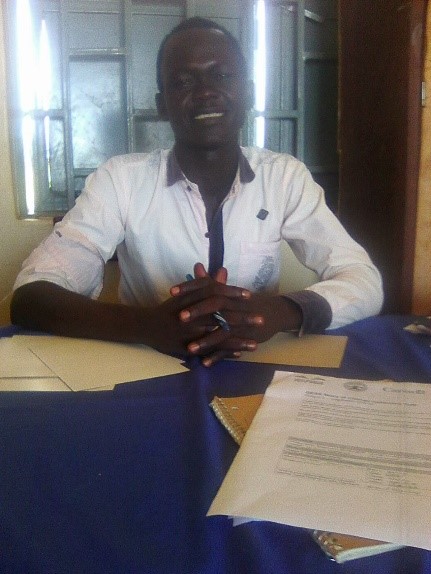
One of the initiatives of the Girls Education South Sudan (GESS) programme is school Capitation Grants, which aid the smooth operation of school. These monies serve as replacement of the fees levied by school administrations on students/pupils. School are able to put up some temporary classrooms and purchase school stationeries, such as pens for teachers, writing pad sand teaching and learning materials, such as chalkboard and teaching aids. In 2019, a total of 39 primary schools received US$ 18,135 in school Capitation Grants in Aweil Centre County. Among the schools, was Udhada Primary School that received an amount of US$ 1,050
This money, according to the Head Teacher of Udhaba Primary School, James Uponi Deng, helped them to repair school windows and doors, purchase of chairs and some recreational materials, like footballs and volley balls. Udhaba Primary School was founded in 2010, when returnees from Sudan and Internally Displaced Persons (IDPs) were moved to Udhaba village by the government of Northern Bahr el Ghazal State. In 2020, enrolment is 717, of which 307 are girls while 410 are boys. The school first was established and operated under the trees, a situation that was not conducive for teaching and learning. The school is also placed along a road where there is a lot movement from people and vehicles, which disturbed the environment due to too much noise.
When the school was first established, all teachers were volunteers. The teachers did not make it onto the government payroll until 2016, when five teachers were appointed by the State Ministry of General Education and Instruction onto the payroll for the first time. Another challenge faced by the school was lack of School Management Committee (SMC – a variation of the traditional teacher/parent body to include the Head Boy and Head Girl) because the school management were not aware of its roles and responsibilities and how to establish it. Udhaba Primary School first benefitted from GESS through training on the roles and responsibilities of the SMC; how to establish the SMC and how to prepare a school development plan and budget. “This has tremendously built our capacity as school administration”, mentioned James. One of the requirements schools must meet in order to receive the GESS Capitation Grant is the formation of a SMC. Since forming the SMC, Udhaba Primary School has received six Capitation Grants. James continued, “The money has helped us to support some needy girls in school by buying for them uniforms, school bags and paying for examination fees when there are girls sitting for final exams which out of our control and when it is compulsory to pay fees. Capitation grant also helped our school to have separate latrine for girls as it is always difficult for boys to share one latrine with girls. This has helped has reduce rate of absenteeism as well as drop out of girls.”
The school was able to construct temporary learning spaces using the Capitation Grant. Last, but not the least, most of our volunteer teachers depended on small incentive they got from school capitation before IMPACT teachers’ incentive was introduced. This helped to retain teachers (who) would have moved away from our school if they were not incentivised using capitation grant.” “We wish that GESS project funding continues till the time when our government will be in strong position to meet our needs alone. We plan to purchase computer for storing school information and bicycle for school head teachers to facilitate his movement.”
